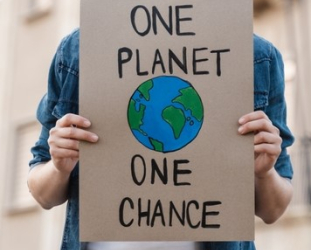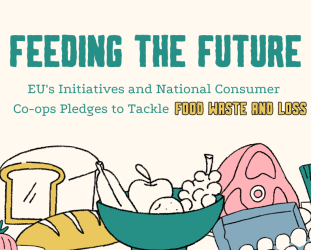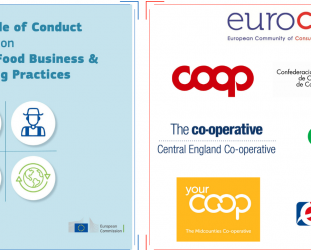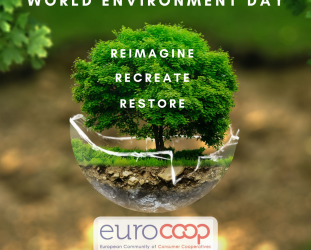Euro Coop Response to the EC Consultation on a Roadmap for a Resource Efficient Europe
19.04.2011 23:00:00

On 22nd February 2011, the European Commission (EC) launched a consultation on a “Roadmap for a resource-efficient Europe” with the aim of gathering stakeholders’ views on how to deliver a smart, sustainable and inclusive growth in Europe by 2020. Consumer co-operatives, as responsible economic and social actors, have been and are ready to play a fundamental role in reaching these objectives and therefore highly welcome the opportunity to provide input on such topical issues. They are indeed enterprises which act on the market according to values and principles and, having at the same time an international vision and a local focus, they are in a privileged position to establish sustainable practices and policies aimed at limiting and optimizing resource use.
This preliminary point made, Euro Coop would like to underline first of all the urgency to act regarding the issue of resource scarcity. In fact, at today’s level of global consumption, natural resources are in severe danger of over-exploitation and potential collapse. Fresh water reserves and forests are shrinking, many species are under threat of extinction and fertile land is being eroded. That is why action to enhance resource efficiency must be undertaken immediately on the basis of a regulatory framework that provides long-term stability. To this aim, the European Union (EU) needs to start a significant transition in energy, industrial, agricultural and transport systems as well as foster changes in producers and consumers’ behaviours. Resource efficiency should though be primarily looked at as a key opportunity to boost future competitiveness by reducing energy consumption as well as the amounts of material needed to carry out the same processes.
In this respect, Euro Coop believes that the conversion of the non-binding 2020 energy efficiency goal into a requirement could greatly contribute to attain the above-mentioned objectives, even if it deems that Member States should be allowed flexibility on how this should be achieved. Also, Euro Coop considers that a stronger action in promoting renewable energies should be set, with the view also to reduce energy dependency. Energy efficiency and the promotion of renewables have been indeed since a long time now a priority for several consumer co-operatives gathered in Euro Coop. They see in fact in their active support a way to satisfy their consumer needs and expectations whilst attaining at the same time considerable savings. Nonetheless, as regards renewables Euro Coop’s members identify price as a barrier to invest in them and therefore call the EU to design policies aimed at making “greener choices” more affordable.
Another area in which consumer co-operatives would like to see an enhanced action with the view of reaching a more resource efficient Europe is sustainable consumption and production (SCP). Several Euro Coop members are indeed increasing their efforts to source goods which are produced in a more sustainable and resource-efficient manner, privileging therefore those bearing sustainability certifications in the areas of ecological production (first of all the European Eco-label), sustainable fishing, organic farming, sustainable managed forests and local sourcing. Consumer co-operatives in fact consider that improvement in all these fields is critical to attain resource efficiency as well as to stimulate sustainable production and consumption processes. Within them, it is important to underline the function played by own brands products, which Euro Coop sees as essential to strengthen environmental criteria and bring about the desired change in consumer members’ behaviour. In order to attain the same goal, Euro Coop also believes that an effective measure could be to put in place well-designed and effective Green Public Procurement policies.
A further point that Euro Coop wishes to make regards then the need for the EU to deploy an effective information and education strategy aimed at orienting consumers towards a more resource-efficient lifestyle. Euro Coop, which represents 29 million consumer-members across Europe, believes in fact that an active and aware citizen is key to a successful implementation of all sustainability policies and therefore targeted campaigns as well as the development of ad hoc educational tools are strongly needed to reach the wider EU public. Being owned by consumer-members who participate in the strategic management of the enterprise, consumer co-operatives, from their side, work intensively to educate, train and inform employees and consumer members. This feature is inherent to the co-operative identity and distinguishes consumer co-operatives from other private retailers operating in the sustainability field.
An additional topic of critical importance to shape a resource-efficient Europe relates then to the modeling of more effective waste policies. From their side, Euro Coop members are committed to start the journey towards a zero waste vision, including pursuing an active packaging optimisation policy as well as an enhanced prevention activity. Reduce, reuse and recycle stay at the core of Euro Coop members’ action and a lot of attention is also increasingly devoted to how to appropriately treat surplus food and non-eatable food waste. In this regard, several initiatives were for example developed by some Euro Coop members in the area of discounting products close to the expiry date, optimizing purchase orders and recovering unsold food products which are still edible to donate them to people in need.
The last two sectors in which Euro Coop recommends to take a strong action with the view of minimizing and optimizing resource use are then the transportation and the building ones. Regarding the first sector, with growing freight and passenger transport, pollution and congestion risk is aggravating. This means, above all, that the EU must strive to promote co-modality in transportation, i.e. the optimal combination of various modes of transport within the same transport chain. Technical innovation and a shift towards the least polluting and most energy efficient modes of transport — especially in the case of long distance and urban travel — should be also encouraged. Consumer co-operatives, on their side, implement a wide range of initiatives to optimize transport processes, which in many cases are at the forefront of available techniques and constitute replicable best practices. These include, among others, the switching when possible from road to train transportation, the use of co-modality, constant innovation to lower impacts of individual modes, investment in new technologies and a continuous co-operation with key supply chain partners.
As regards instead the building sector, Euro Coop deems that building practices cause a broad range of direct environmental impacts, spacing from the use of raw materials for their construction and renovation to the consumption of natural resources, like water and fossil fuels, and the emission of harmful substances. They are therefore a major area of concern in which consumer co-operatives are acting and in which they are even more committed to act in the future. In this regard, it is critical that the EU comes to a full implementation of the Energy Performance of Buildings Directive to ensure that all new buildings meet zero net energy requirements by 2020.
In conclusion, Euro Coop believes that the benefits of a resource-efficient Europe far outweigh the challenges and that a commitment to diminish the use of resources is the winning strategy for competitiveness and prosperity in Europe. In Euro Coop’s views this change should be brought about by designing and implementing an ambitious, comprehensive and not-conflicting set of policies, able to create the material and cultural infrastructure on which to build the road to a resource-efficient Europe. In framing this process, consumer co-operatives should be considered as key partners by virtue of the peculiar and yet universal business model they represent. Being in fact consumer-owned and democratically controlled enterprises which base their market operations on values and principles like, for example, intergenerational solidarity, concern for the community and for the Environment, they should be regarded as privileged counterparts within the business arena. Their very structure in fact prevents them from embarking in any green washing action, thereby ensuring a true commitment to reaching a resource efficient Europe by 2020.
Euro Coop ID number in the EC’s register of interest representatives: 3819438251-87 |
For further information, please contact:
Rosita Zilli – Euro Coop Policy Adviser
Email: [email protected]
Tel.:+32-2-285-00-72 - Fax: +32-2-231-07-57
Latest Sustainability Policy news

Euro Coop Joins +140 Organizations in Urgent Call to Preserve EU Green Measures
Euro Coop stands alongside 140+ civil society organisations in a crucial plea to EU...

EU Overshoot Day - Euro Coop urges EU leaders to tackle the nature, climate and pollution crises
Today marks the EU’s overshoot day, signifying that if global consumption mirrored EU...

Manifesto for agricultural transition to address systemic climate crises
Euro Coop, together with 12 civil society organisations call on the European Institutions to...
Latest Sustainability Policy stories

Euro Coop's New Publication: Addressing the Global Food Waste Crisis on International Day of Awareness
On the occasion of the 2023 International Day of Awareness on Food Waste and Loss, Euro Coop...

Press Release: EU Code of Conduct
Today, the European Commission unveiled the long-awaited EU Code of Conduct on Responsible...

World Environment Day 2021
This year’s World Environment Day marks a perfect opportunity to...

